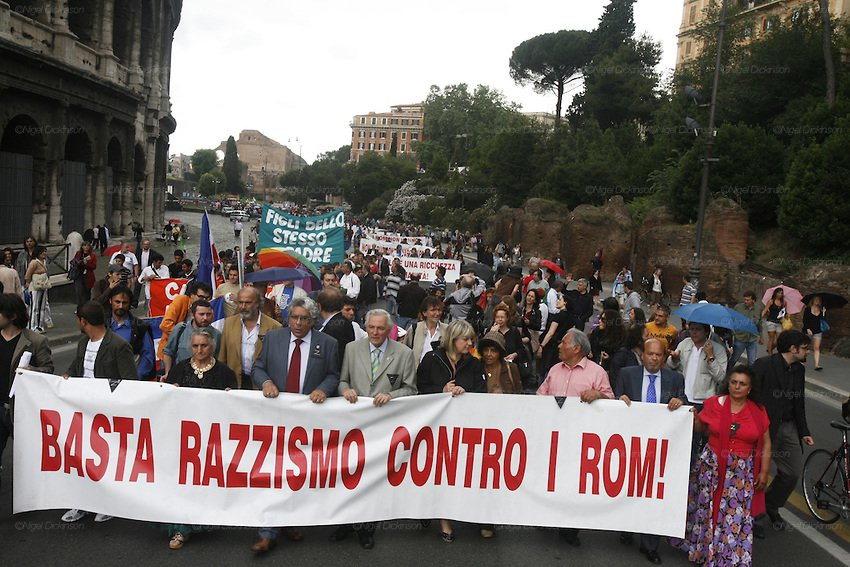New UN rebuke for Italy on hate speech, hate crime and forced evictions of Roma
22 December 2016
The Committee on the Elimination of Racial Discrimination (CERD), in its concluding observations just issued, called on the Italian authorities to halt all further evictions of Roma, and to scotch any plans to establish new segregated camps. This stands as a forthright vindication of the concerns highlighted by the ERRC in its recent submission to the Committee.

Photo credit: Nigel Dickinson
These latest conclusions coming on top of evidence of discrimination provided in submissions from the ERRC, Amnesty and partner organisations in Italy, combined with “expressions of concern” from Strasbourg bodies earlier this year at the increase in xenophobia and anti-Gypsyism, and the widespread and commonplace use of intolerant and racist language in political discourse and media outlets, provide sobering reminders that years later, Roma are still suffering the consequences of Berlusconi’s illegal “Nomad Emergency”.
The deliberate fomenting of anti-Roma prejudice by the political right during the ‘emergency’ has left a lasting impact on Italian society. The Pew Research Centre’s research on negative views of minorities published this year, confirmed not only that Roma received the most negative ratings compared to Muslims and Jews across the EU, but that Italy topped the prejudice list with 82% of those surveyed expressing “very or somewhat unfavourable views” on Roma, compared to 69% against Muslims.
The mounting evidence and widening international condemnation in 2016 of discriminatory practices against Roma and denial of access to public services by public authorities in Italy suggest that it is now incumbent upon the European Commission to initiate infringement proceedings against the Italian government for persistent breaches of the Race Equality Directive.
ERRC submission
In its submission to CERD, the ERRC expressed its concerns that despite numerous rebukes and recommendations from international bodies, Italy persists with targeted mass evictions and de facto segregation of Roma communities in poorly equipped camps.
The ERRC submission made it clear that earlier requests from CERD went unheeded: no progress was made on provision of effective remedies to Roma for the negative impact of the so-called Nomad emergency decrees; and no moves made to consult with Roma communities in the development of programs directed at them.
The submission provided evidence that the situation in Italy has in fact worsened, and also found that CERD’s calls for stronger efforts to combat and punish both racist violence and hate speech directed at Roma and other minorities have yet to be adequately addressed.
Thousands of Roma families still live in ethnically segregated camps across Italy, often in remote areas far away from basic services. Many of the sites are unfit for human habitation, adjacent to waste dumps, toxic landfills and airport runways. And amidst the squalor, old and young alike live under constant threat of repeat evictions.
The government committed to a reduction of the “system of camps” in its National Roma Integration Strategy (NRIS). But far from reducing the “system of camps”, Italian authorities have continued to approve the construction of new segregated Roma-only camps and shelters, to be subsidized with hundreds of thousands of euro drawn from EU and national funds. As the ERRC submission noted “The authorities seem to have ample resources to build and maintain segregated facilities, but never to dismantle them.”
Discrimination, evictions, hate speech, hate crime
In addition to calling for a halt to plans to carry out further evictions, or establish new segregated camps or segregated housing areas that separate Roma from the larger society, CERD called on the Italian authorities “as a matter of priority” to end the system of segregated camps and ensure the provision of adequate and culturally appropriate accommodation to Roma.
The Committee also expressed regret at the failure of the state, despite previous assurances, to establish an effective and independent national human rights institution; and deep concern at the prevalence of racist discourse, stigmatization and negative stereotypes in political debates. CERD called for the lifting of parliamentary immunity for racist hate speech, and for the state to ensure that victims are provided with effective remedies.
On hate crime, the Committee criticised the lack of systematic data collection of such incidents and expressed concern at recent reports of racially motivated violence and crimes and the lack of effective responses to such acts. Citing the so-called Mancino’s Law, which recognizes a “racist motive” as an aggravating circumstance only when it is the sole motivation, but not when there are mixed motives, CERD called for the law on aggravating circumstances to be strengthened to apply it to ordinary crimes when racial hatred is one of several and/or mixed motivations.
Conclusion
The CERD recommendations also called for efforts to prioritise efforts to ensure that Romani children can access quality education, in settings where they suffer no form of segregated schooling or negative treatment; to ensure that housing legislation, policies and practices do not discriminate against Roma in the enjoyment of their rights, including access to social housing and benefits; to end statelessness and to ensure that the NRIS leads to tangible improvements for Roma in the exercise of their rights. CERD also called on Italy to provide effective remedies and reparations to Roma who have suffered human rights violations, including as a result of the implementation of the Nomad Emergency Decree.
On current form, it is unlikely that the Italian government will pay much heed to these recommendations. When it comes to Roma, there seems to be a determination to persist with, rather than dispose of policies and practices inherited from Berlusconi’s Nomad Emergency.
Such discriminatory policies are in clear breach of Italy’s international commitments, everyday practice runs totally counter to the stated objectives of the EU Framework for National Roma Integration Strategies, and flies in the face of the Race Equality Directive. The European Commission needs to make a New Year resolution to launch infringement proceedings against this recalcitrant member state in 2017.




